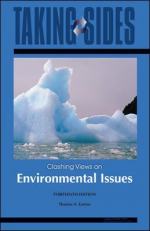|
This section contains 2,573 words (approx. 9 pages at 300 words per page) |

|
American environmental concern traces back to Jeffersonian ideas of a unique American connection to land and the romantic ethos of the nineteenth century. Open land, sometimes viewed as "wilderness," defined the New World for many European settlers. Thomas Jefferson argued that this open land could be transferred into an American strength if development were directed toward an agrarian republic. While much of the nation would pursue land-use similar to the landscape of Jefferson's ideal, some urban Americans remained intrigued by Jefferson's idea of a unique American connection to the natural environment. This can be seen in the adoption of European forms such as parks and gardens and in the intellectual tradition of romanticism and transcendentalism. By the end of the 1800s, wealthy urbanites pursued "wild" adventures in sites such as the Adirondacks, initiated organizations to conserve animal species or limit pollution, and, finally, set aside areas of nature...
|
This section contains 2,573 words (approx. 9 pages at 300 words per page) |

|


